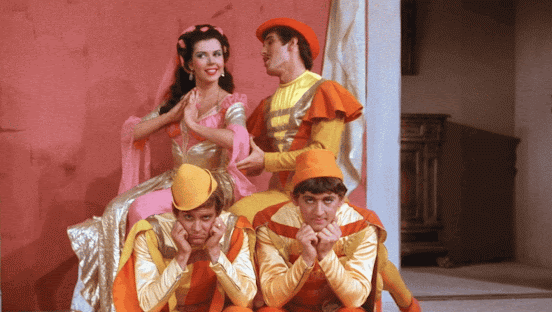A Very Special Bonus Screening
I know I said that our current series of films was concluding last week, but I am now in a position to announce one more special bonus screening. And it is a very special one indeed.
In a series that has focused on films that re-work the classics of drama and literature, there is one film that has been very conspicuous in its absence (especially if you have ever met me!). It has been absent, not by choice or design, but simply because I wasn't sure whether it would be physically possible to screen it in our temporary accommodation, surrounded as we are by scaffolding.
Having now carried out a field test, I am happy to announce that our next screening, on Thursday, the 26th of May, will be Cole Porter's Kiss Me Kate. In 3D.
Actually a musical-within-a-musical, Kiss Me Kate tells the story of Fred Graham, a famous (albeit slightly hammy) Broadway star who is mounting a new musical version of The Taming of the Shrew with his ex-wife Lilli.
Throw in a pair of low-life hoodlums who seem to have stepped straight out of Guys and Dolls...
...and of course Cole Porter at the very height of his genius, providing iconic (and extremely risqué) songs.
Kiss Me Kate was a very unusual Hollywood musical for several reasons. First, it is remarkably faithful to the original Broadway production. While many other filmed adaptations had been changed so drastically as to be completely unrecognisable (yes, On The Town, I'm thinking of you) Kiss Me Kate is a very respectful adaptation of the Broadway original. True, some of the more outrageous lyrics had to be "sanitised" but a lot is actually left in. You have to wonder what the Censors were doing that day:
If she says your behaviour is heinous;
Kick her right in the Coriolanus!
Secondly, everyone in the cast is doing their own singing. Hollywood had a bad habit of choosing star power over vocal training, which led to some bizarre casting decisions in other musicals. Marlon Brando was a wonderful actor, but his singing in Guys and Dolls left a lot to be desired. My Fair Lady may have been a career-defining moment for Julie Andrews on Broadway, but she was replaced in the film by Audrey Hepburn, who couldn't sing; couldn't act; and couldn't do a Cockney accent (apart from that, she was perfect). As we saw a couple of weeks ago, everyone in West Side Story had to be dubbed (casting Natalie Wood was apparently more important than casting someone who could actually sing. Or was Puerto Rican). Almost everyone in South Pacific is dubbed. The Broadway production had turned Mary Martin and Ezio Pinza into household names (and the cast album had spent a mind-boggling 400 weeks in the charts) but neither of them made it into the film version.
Even Carmen Jones dubbed the singing voices of its stars, despite the fact that both Dorothy Dandridge and Harry Belafonte were magnificent singers (they simply had the wrong voices for the operatic singing required in Carmen).
Given all of that, it's even more remarkable that Kiss Me Kate not only casts accomplished singers, it casts the right singers for the parts. Kathryn Grayson and Howard Keel both had operatic training (which is needed for their roles here) and Ann Miller could do everything.
The dance sequences in Kiss Me Kate were overseen by legendary Hollywood choreographer Hermes Pan, who is best remembered for his long association with Fred Astaire.
He makes a rare on-screen cameo in Kiss Me Kate (as a slightly heterosexual sailor)…
…but perhaps the most memorable moment belongs not to Hermes Pan but to the young dancer cast as the "Third Suitor".
Bob Fosse was just another working dancer in 1953, but Hermes Pan saw him fooling around on the set between takes one afternoon, and was impressed enough to allow him to choreograph his own little sequence in the middle of the "From This Moment On" number. Thus Kiss Me Kate became the first time anyone had witnessed that distinctive sideways shuffle that was to become known as the "Fosse Amoeba".
In addition to all of this is the fact that Kiss Me Kate was filmed in stereo (as in 3D).
Stereoscopic photography dates back to 1838 (paradoxically, a year before the advent of photography itself) and collections of stereo photographs were very common in Victorian households. The American Civil War and the First World War were extensively photographed in 3D, and it was inevitable that film-makers would experiment with making movies in 3D.
Generally speaking, Hollywood went through three distinct waves of 3D film production. Most recently of course is the digital era of the last decade or so, but before that was a brief period in the 1980s and another larger one in the early 50s.
Kiss Me Kate is regarded by many (myself included) as the finest example of 3D film-making from that first era. It obviously helps that the film itself is so good, but beyond that, the stereo photography is put to very intelligent use.
Much advantage is made of the idea of musical numbers as "performances" and quite a lot of it is delivered directly to the camera. While this can look quite forced in a "flat" movie, it reinforces the sensation of us as the literal audience, watching artists giving a performance (just as if they were on a stage, performing to us in person). True, they also can't resist repeatedly throwing things at us (bless) but this was all part of Hollywood's increasingly desperate attempts to lure people away from their television sets.
The end result of all this is a work of art that comes together in a unique and magical way to produce one of the great musicals of all time.
And we will be screening it this Thursday at 7.30!

















Comments
Post a Comment